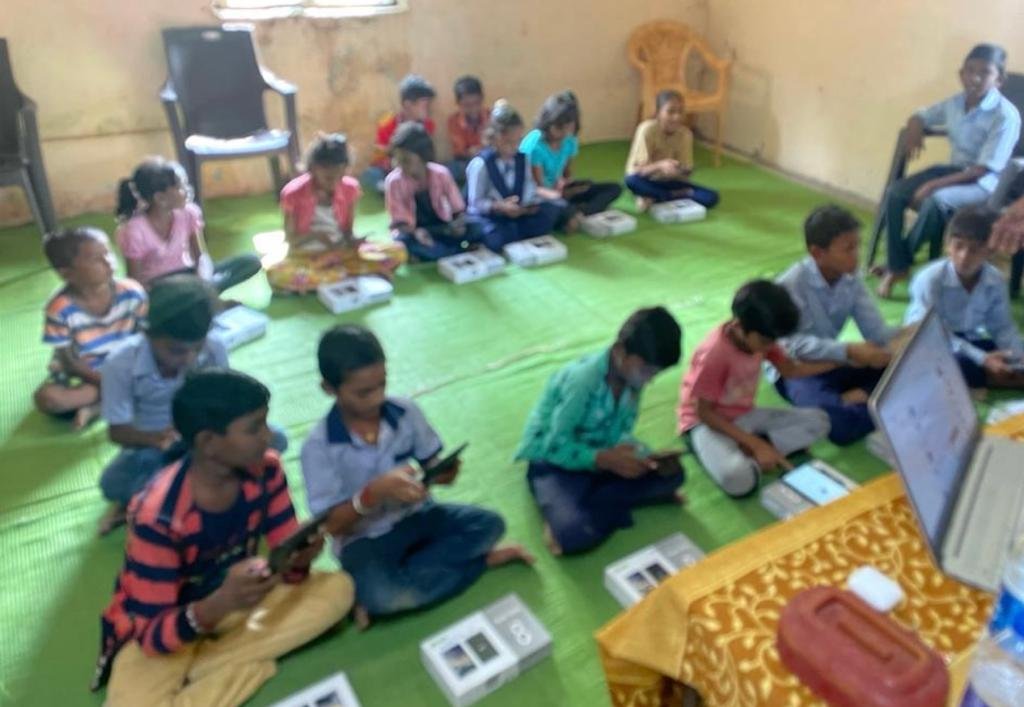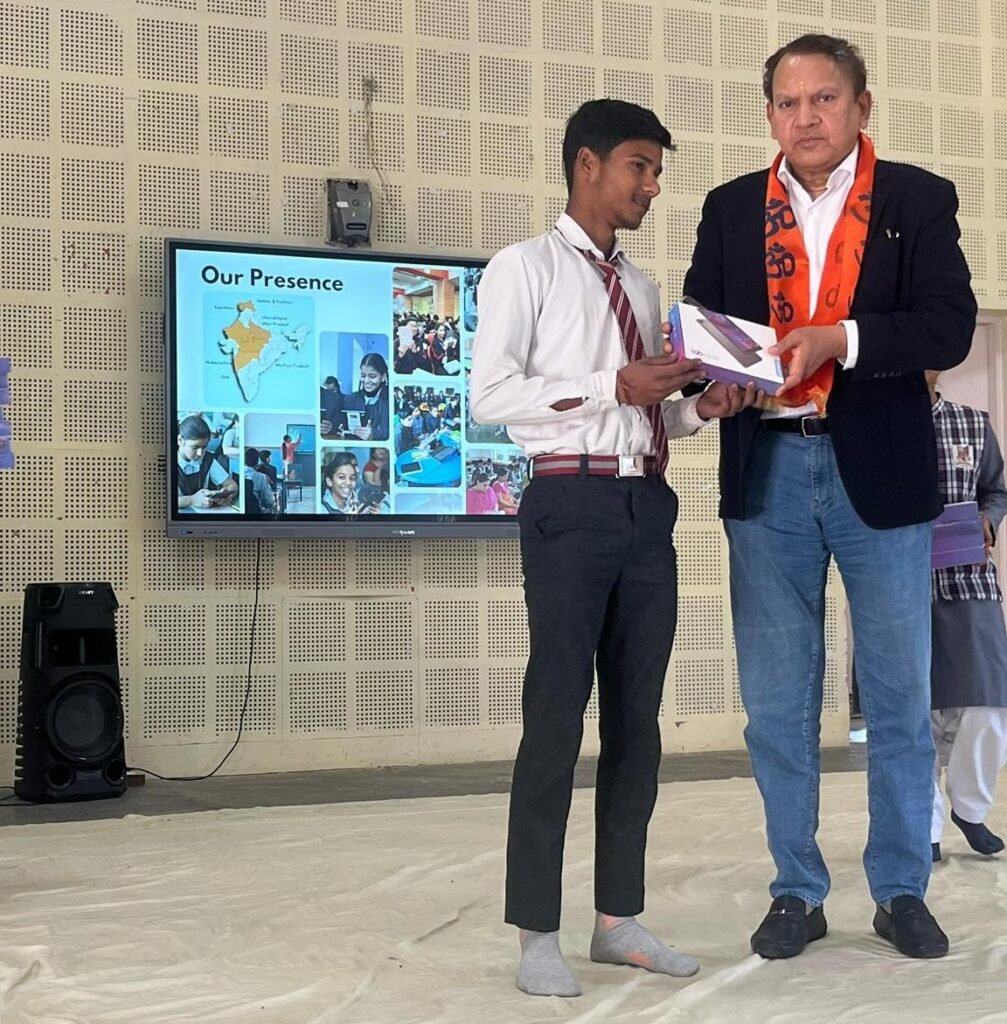How Satish Jha’s global experience inspires Ashraya’s mission to make quality education accessible for all.
By Deepa J Singh
Satish Jha’s professional journey seamlessly weaves together journalism, global technology leadership, and social innovation. From editing Dinmaan and launching Jansatta to leading international technology initiatives, his experiences shaped a unique vision — one where education becomes the true equalizer. Over two decades ago, he founded Ashraya, an initiative that reimagines India’s education system by addressing structural gaps, fostering teacher leadership, and integrating technology to create sustainable learning ecosystems.
Through Ashraya, Jha aims to transform ordinary schools into thriving centers of excellence that rival global standards — driven by empathy, data, and community ownership. In this exclusive interview, he speaks about the philosophy, challenges, and global vision behind Ashraya’s mission to make quality education accessible and equitable for all.
In this exclusive conversation with Deepa J Singh, a social marketing strategist passionate about communicating social change, Satish Jha shares his journey, insights, and vision for transforming education through innovation and compassion.
1. What was the original impetus behind founding Ashraya, and how did your experiences in journalism and global tech leadership shape its mission?
The founding of Ashraya stemmed from a realization during my travels and work across a few countries in Europe, America, Australia and Aftica that: education is the great equalizer, yet in India, it was failing millions due to systemic inefficiencies and a lack of focus on quality outcomes.
Over 25 years ago, after launching Jansatta, editing Dinmaan for the Times of India, and serving as a global CIO for a Fortune 100 company, I saw how information and technology could empower people. Journalism taught me the power of narratives to drive change, while tech leadership showed me how structured systems and innovation could scale solutions. Ashraya was born from this—to bridge the education gap by infusing schools with rigorous, outcome-driven approaches, much like optimizing a global enterprise, but in a microcosm, with a human-centered focus on India’s underserved children.
2. You’ve worked across continents and sectors—what gaps in India’s education ecosystem did you feel uniquely positioned to address through Ashraya?
Having invested in and mentored a few tech startups in the US, supporting the launch of the Ghana-India Kofi Annan Center in Accra as a board member, and leading the Economic Opportunities Commission for the World IT Forum (WITFOR), I witnessed how education disparities perpetuate poverty cycles worldwide.
In India, the gaps were glaring: grossly inadequate infrastructure, rote learning over critical thinking, inadequate teacher training, and a disconnect between curriculum and real-world skills. My cross-sector experience helped me see these by introducing tech-enabled diagnostics, leadership development for educators, and sustainable models that emphasize depth over superficial coverage.
Ashraya fills these voids by transforming ordinary schools into high-performing ones, drawing from global insights to make education equitable and impactful.
***
On Ashraya’s Distinctiveness
3. Ashraya’s outcomes are said to rival those of public schools in affluent nations. What specific pedagogical or systemic shifts enable this transformation?
Our outcomes compare well on cognitive corners with affluent nations’ schools because we prioritize systemic shifts like personalized learning paths, assessments, and fostering a culture of inquisitiveness, and working with the aspirations of students that ker.
Pedagogically, we move from memorization to inquiry-based learning, integrating tech tools for interactive education. Systemically, we invest in teacher empowerment through ongoing training and leadership programs, ensuring infrastructure supports like tech labs as distinct from computer labs. These changes, implemented thoughtfully, create environments where students learn how to connect the dots better, think on a larger canvass rather than the common verbiage we hear about “excel academically, develop life skills, mirroring the best global standards etc”.
4. How does Ashraya’s approach differ from other well-known education initiatives in India, particularly in terms of quality, depth, and sustainability of impact?
Unlike many initiatives that focus on short-term interventions or scale through quantity, Ashraya emphasizes depth and sustainability. We differ by starting with a well rounded school diagnosis, building local ownership, and try embedding changes that outlast our direct involvement.
For instance, while others might provide resources sporadically, we create self-sustaining ecosystems with trained leaders and community involvement. This has led to lasting impacts in diverse settings, from government schools in Bhopal and Yavatmal to partnerships with Vidyabharati schools, Katha School, Kaifi Azmi School, and Samvid Gurukul—ensuring quality isn’t a one-off but a perpetual transformation. The weakness that I see is we don’t know what happens once we disengage from the school. It is a bit of work to embed sustaining learning ecosystem.
5. What role do local champions, school readiness, and infrastructure play in determining the pace and depth of transformation?
Local champions—dedicated teachers, principals, and community leaders—are the heartbeat of our transformations; they drive ownership and cultural fit, accelerating pace by 2-3 times in engaged schools. School readiness, assessed through our initial diagnostics, sets the foundation: willing institutions adapt faster, allowing deeper pedagogical shifts.
Infrastructure, while not the sole factor, acts as an enabler—basic upgrades like digital tools or learning spaces amplify impact. In our work across dozens of Vidyabharati schools or government ones in Yavatmal, we’ve seen that aligning these elements ensures transformations are not just rapid but profoundly enduring and when not aligned well, the progress is felt by the students but the system becomes a barrier.

***
On Strategy and Implementation
6. Can you walk us through a typical Ashraya intervention—from diagnosis to transformation? What are the non-negotiables?
A typical intervention begins with a management buy in, getting principals to see the value of the program who tries to carry the teachers along, helps in comprehensive diagnosis: assessing academics, infrastructure, teacher capabilities, and community engagement.
We then co-create a tailored roadmap, focusing on teacher training, curriculum enhancement, and tech integration. Implementation involves phased rollouts—starting with pilot classes, scaling based on feedback, and monitoring via metrics.
That’s followed by establishing adequate digital infrastructure, nurturing the learning ecosystem, supporting the teachers with our own staff, training both teachers and students, monitor, assess, loop in the feedback, slowly keep including other classes etc.
Transformation is designed to culminate in self-reliance, where schools sustain improvements independently. Non-negotiables include commitment from school leadership, data transparency, and a focus on holistic child development—ensuring every step aligns with long-term equity.
7. How do you measure success beyond test scores? Are there qualitative indicators that matter just as much?
Beyond test scores, we measure success through student engagement, teacher retention rates, and community involvement—indicators of a thriving ecosystem. Qualitatively, we track life skills like critical thinking and resilience via portfolios and feedback loops. In partnerships like with Shabana Azmi’s Kaifi Azmi School or Sadhvi Ritambara’s Samvid Gurukul, we’ve seen the change in students perspective, in pursuing higher education or entrepreneurship, which speaks to deeper impact. These qualitative metrics ensure our work fosters well-rounded individuals, not just exam performers.
8. What are some of the most significant challenges you’ve faced in scaling Ashraya’s model across diverse geographies and school systems?
Scaling across our diverse geographies has meant navigating bureaucratic hurdles, cultural variances, and resource disparities. Without naming anyone, resistance to change from entrenched systems was a key challenge, addressed through persistent dialogue and demonstrated results.
Funding sustainability and adapting to local languages/customs in Vidyabharati networks required innovative partnerships. Despite these, our model’s flexibility—rooted in my tech and global experience—has allowed us to overcome some of them, turning challenges into opportunities for refinement but results could have been much better if the culture allowed it.

***
On Replicability and Scale
9. Is Ashraya’s model replicable in other developing countries? What contextual adaptations would be necessary?
Absolutely, Ashraya’s model is replicable in developing countries, as evidenced by elements we drew from my requests we have been receiving from a few developing countries in Asia and Africa.
Adaptations would include localizing curricula to cultural contexts, integrating region-specific tech access, and partnering with indigenous leaders. For instance, in Africa or Southeast Asia, we’d emphasize community-driven diagnostics to address unique challenges like language barriers or conflict zones, ensuring the core principles of empowerment and sustainability remain intact.
10. What would it take for a state government or a large school network to adopt Ashraya’s model at scale?
Adoption at scale requires political will, dedicated funding, and a framework for collaboration. A state government or network like Vidyabharati would need to commit to training programs, policy alignments for training the teachers to a level they can become participants in change, and ongoing evaluation. From my experience advising on pilot implementations in select districts could demonstrate ROI, paving the way for statewide rollout. Key is building internal capacity to sustain it post-adoption.
11. Have you explored partnerships with international development agencies or multilateral institutions to scale Ashraya’s impact globally?
Yes, we’ve engaged in conversations with agencies like, leveraging my WITFOR experience and global networks. While we’ve supported a few initiatives, in Ethiopia, Ghana, Botswana, Vietnam and others formal partnerships are in exploration stages for global scaling. These could amplify impact by providing resources for tech integration and cross-border knowledge sharing, aligning with Ashraya’s vision of universal educational equity.

***
On Leadership and Legacy
12. You’ve chaired tech firms, advised governments, and now lead a transformative education initiative. What connects these roles?
The throughline is a commitment to leveraging systems for human empowerment. From leading a few US tech startups and a consulting firm to editing Dinmaan and launching Jansatta, each role involved innovating to bridge gaps—whether in information access, technology, or education. Ashraya synthesizes this: using tech rigor to transform lives, much like optimizing a Fortune 100’s global operations, but focused on grassroots impact.
13. How do you balance the rigor of systems thinking with the empathy required to transform lives at the grassroots?
Balance comes from viewing systems as tools for empathy, not ends in themselves. My journalism days honed listening skills, while tech leadership taught efficient scaling. In Ashraya, we apply data-driven rigor to diagnostics but infuse empathy through personalized support for teachers and students. In partnerships like with Geeta Dharmarajan’s Katha School, this means adapting strategies to individual stories, ensuring transformations are humane and effective.
14. What legacy do you hope Ashraya will leave behind in the Indian education landscape—and beyond?
I hope Ashraya’s legacy is a blueprint for equitable, high-quality education that inspires systemic reform in India and elsewhere. Beyond our direct impacts in schools like those in Bhopal or supported by Shabana Azmi and Sadhvi Ritambara, it’s about proving that transformative education is achievable at scale, empowering future generations to break cycles of inequality.
***
Looking Ahead
15. What’s next for Ashraya? Are there innovations or expansions on the horizon that you’re particularly excited about?
Next for Ashraya is expanding digital platforms for remote teacher training and AI-driven personalized learning, building on my tech background. We’re excited about deeper integrations in large networks like Vidyabharati and exploring pilots in other countries via global partnerships. Innovations like gamified curricula and community-led sustainability models will drive us forward, aiming to hopefully touch many more lives.
(Deepa J Singh is a social marketing strategist, passionate about communicating social change.)
(India CSR)







